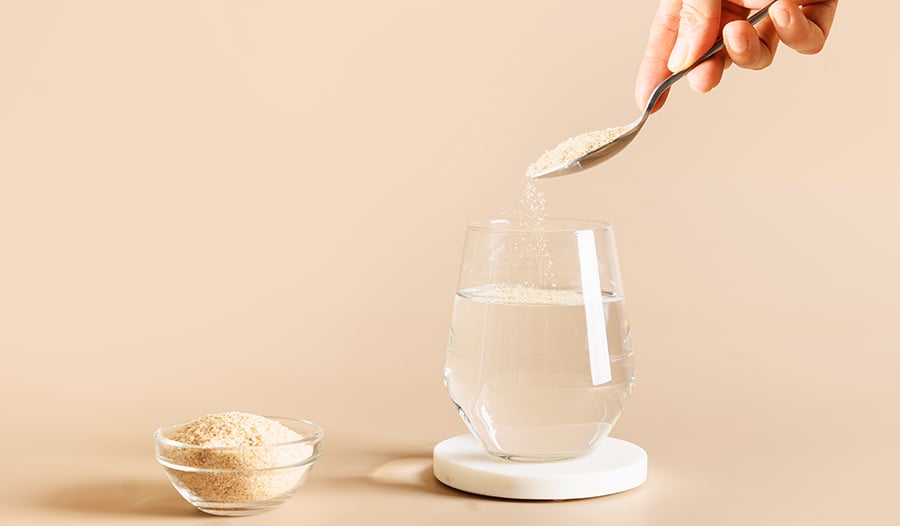Savjeti registriranog dijetetičara za odabir najboljeg dodatka vlaknima

Vlakna, neprobavljivi ugljikohidrat koji se nalazi u biljkama, važan su hranjivi sastojak s mnoštvom zdravstvenih prednosti. Nažalost, većina odraslih ne konzumira dovoljno vlakana - samo 5% Amerikanaca zadovoljava svoje dnevne potrebe za vlaknima.1 Iako se nedovoljna potrošnja vlakana smatra brigom javnog zdravlja, problem je s nekim jednostavnim rješenjima.
Jedenje dobro zaokružene prehrane bogate voćem, povrćem, mahunarkama, orašastim plodovima i sjemenkama vjerojatno će osigurati dovoljno vlakana da zadovolje potrebe vašeg tijela. Međutim, ako vaše uobičajene prehrambene navike ne uključuju ovu biljnu hranu, vjerojatno vam nedostaje ovaj važan hranjivi sastojak.
Ako imate problema s dobivanjem dovoljno vlakana iz obroka i grickalica, dodatak je odličan način da udovoljite vašim potrebama. Čitajte dalje kako biste saznali više o dodacima vlaknima i kako odabrati pravi za svoje potrebe.
Tko bi trebao uzimati dodatak vlaknima?
Većina ljudi može imati koristi od dnevnog dodatka vlaknima- iako oni koji ne dobivaju dovoljno vlakana iz prehrane mogu ubirati najveću nagradu. Bez obzira na unos prehrane, osobe s visokim kolesterolom ili probavnim nepravilnostima također mogu imati koristi od redovnog dodatka vlaknima.
Zdravstvene prednosti dijetalnih vlakana protežu se po cijelom tijelu, od poboljšane probave i zdravlja srca do smanjenog rizika od dijabetesa tipa 2 i određenih vrsta raka. Evo prednosti jedenja dovoljno vlakana - i zašto je dodatak važan ako ne dobijate dovoljno.
Promiče probavnu pravilnost
Postoje dva oblika vlakana - topljivi i netopivi. Netopiva vlakna posebno su korisna za probavni trakt. Ova vrsta vlakana dodaje masu otpadu koji putuje kroz vaša crijeva i može poboljšati pravilnost odlaska u kupaonicu.
Vlakna također mogu omekšati stolicu, omogućujući joj da udobnije prođe, a istovremeno smanjuju vaše šanse za zatvor. Zdraviji i redovitiji pokreti crijeva mogu zauzvrat smanjiti rizik od crijevnih problema, poput zatvora, hemoroida i divertikularne bolesti.
Poboljšava zdravlje srca
Iako su netopiva vlakna najkorisnija za probavnu pravilnost i zdravlje, topljiva vlakna posebno su korisna za upravljanje razinom kolesterola u krvi. Zapravo, jedenje 5 do 10 grama topljivih vlakana dnevno može pomoći u snižavanju ukupnog i LDL "lošeg" kolesterola za 5 do 11 bodova, prema Nacionalnom udruženju lipida.2 Ovo može podržati zdrave razine kolesterola u vašem tijelu i smanjiti rizik od srčanih bolesti i drugih zdravstvenih problema.
Topljiva vlakna također podržavaju zdrave bakterije u vašim crijevima. To može pomoći poboljšanju probave i može smanjiti upalu, dodatno podržavajući zdravlje vašeg srca.
Podržava upravljanje težinom
Još jedna jedinstvena prednost vlakana je ta što vam može pomoći da se osjećate punije nakon jela i održavate zdravu težinu. Vlakna osiguravaju masu bez dodatnih kalorija. Može usporiti probavu, pomažući vam da se duže osjećate punije. Hrana bogata vlaknima poput povrća i voća također ima tendenciju da pruža veliku količinu hrane za relativno malo kalorija. Pregled studija iz 2023. godine otkrio je da su ljudi s prekomjernom težinom ili pretilosti koji su konzumirali psyllium, vrstu topljivih vlakana, prije jela gotovo pet mjeseci značajno smanjili svoju tjelesnu težinu i opseg struka.3
Ključne činjenice o dodacima vlaknima
Vlakna su važan hranjivi sastojak s mnogim neposrednim i dugoročnim zdravstvenim prednostima - stoga je važno svakodnevno zadovoljiti svoje potrebe za vlaknima. Ako se borite da unesete dovoljno vlakana u svoju prehranu, dodatak vlaknima može biti upravo ono što je liječnik naredio.
Prehrambene smjernice za Amerikance postavljaju preporuke za vlakna na temelju unosa kalorija. Ljudi stariji od dvije godine trebali bi težiti da pojedu najmanje 14 grama vlakana na 1.000 potrošenih kalorija. Za većinu odraslih osoba dovoljno je 20 do 30 grama vlakana dnevno.4
Nažalost, Amerikanci u prosjeku konzumiraju samo 15 grama dnevno.5 Nedostatak vlakana može dovesti do neugodnih simptoma, poput zatvora, što može povećati rizik od nekih gastrointestinalnih karcinoma.6 Ako ne jedete dovoljno vlakana, obratite se svom liječniku o uzimanju dnevnog dodatka.
Osim dodataka vlaknima, postoji mnogo namirnica s visokim vlaknima koje možete jesti kako biste značajno povećali unos vlakana. Orašasti plodovi i sjemenke izvrsni su izvori vlakana, kao i zdravih masti i proteina. Prikladni su za međuobrok u pokretu i lako se mogu ugraditi u obroke. Grah i leća su dva od najkoncentriranijih izvora vlakana i sjajni biljni izvori proteina. Na kraju, urmi bogati su vlaknima, a njihova prirodna slatkoća može zadovoljiti vaše slatko zube bez dodanog šećera. Na ovaj popis namirnica s visokim vlaknima možete dodati svo voće i povrće.
Odabir najboljeg dodatka vlaknima za vas
Prilikom odabira dodatka vlaknima važno je uzeti u obzir koji su vaši ciljevi za uzimanje dodatka. Budući da postoje dvije vrste vlakana, topljiva i netopiva, vaši razlozi za uzimanje dodatka mogu utjecati na to što je najbolje za vas.
Na primjer, ako ste zainteresirani za uzimanje dodatka za poboljšanje razine šećera u krvi i kolesterola, topljiva vlakna mogu biti vaš najbolji izbor. Srećom, puno dodataka vlaknima pruža nekoliko grama topljivih vlakana. Ako tražite načine za poboljšanje probavne pravilnosti i ublažavanje zatvora, dodatak s više netopivih vlakana može biti bolja opcija.
Osim procjene koja je vrsta vlakana najkorisnija za vaše potrebe, trebali biste uzeti u obzir i oblik dodatka. Dodaci vlaknima dostupni su u gumama, prašcima i kapsulama. Gumice i kapsule lako se mogu uzimati samostalno ili zajedno s drugim dodacima, dok se dodaci vlaknima u prahu mogu dodati u vaš jutarnji smoothie ili zobene pahuljice ili jednostavno konzumirati u čaši vode ili soka.
Osim što odaberete dodatak na temelju zdravstvenih potreba i oblika, uvijek pročitajte ploču o prehrani i odlučite se za dodatke s minimalnim dodanim šećerom. Također možete razmotriti opcije koje pružaju dodatne hranjive tvari, poput proteina, kao dodatni bonus.
Prije kupnje dodatka vlaknima, posavjetujte se sa svojim liječnikom kako biste utvrdili koja vrsta vlakana može biti najbolja za vas - i treba li vam uopće dodatak vlaknima.
Za van
Iako vlakna nude dalekosežne zdravstvene prednosti, većina nas ne konzumira dovoljno ove važne hranjive tvari. Bilo da želite poboljšati svoju probavnu pravilnost, pomoći u snižavanju razine kolesterola, podržati upravljanje težinom ili smanjiti rizik od određenih karcinoma, dodatak vlaknima može pomoći. Razgovarajte sa svojim liječnikom kako biste utvrdili je li dodatak vlaknima pravi za vas i koja vrsta vlakana - topiva ili netopiva - pomoći će vam da ispunite svoje zdravstvene ciljeve.
Reference:
- Quagliani D, Felt-Gunderson P. Zatvaranje jaza u unosu vlakana u Americi: Komunikacijske strategije sa samita o hrani i vlaknima. Am J Lifestyle Med. 2017; 11 (1): 80.
- Dodavanje topljivih vlakana za snižavanje kolesterola. Nacionalno udruženje lipida. Pristupljeno 24.9.9.
- Gibb RD, Sloan KJ, McRorie JW. Psyllium je prirodno nefermentirano vlakno koje stvara gel koje je učinkovito za mršavljenje: sveobuhvatan pregled i meta-analiza. J Am doc. medicinska sestra Prakt. 2023; 35 (8): 468-476.
- Prehrambene smjernice za Amerikance 2020-2025. USDA. Pristupljeno 24.9.9.
- Giorgetti GM, Eramo A, Clemente V, Ramos GP, Ramos O. Dijeta s visokim sadržajem vlakana. Divertikularna bolest debelog crijeva. Objavljeno na mreži 1. svibnja 2023:201-208.
- Sundbøll J, Thygesen SK, Veres K i sur. Rizik od raka u bolesnika s zatvorom. Clin Epidemiol. 2019; 11:299.
ODRICANJE OD ODGOVORNOSTI: Ovaj Wellness kutak nije namijenjen za pružanje dijagnoza...

















































































 Sadržaj
Sadržaj















